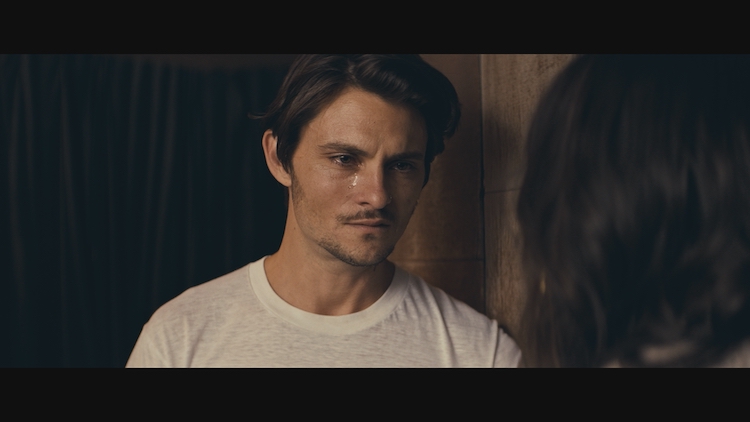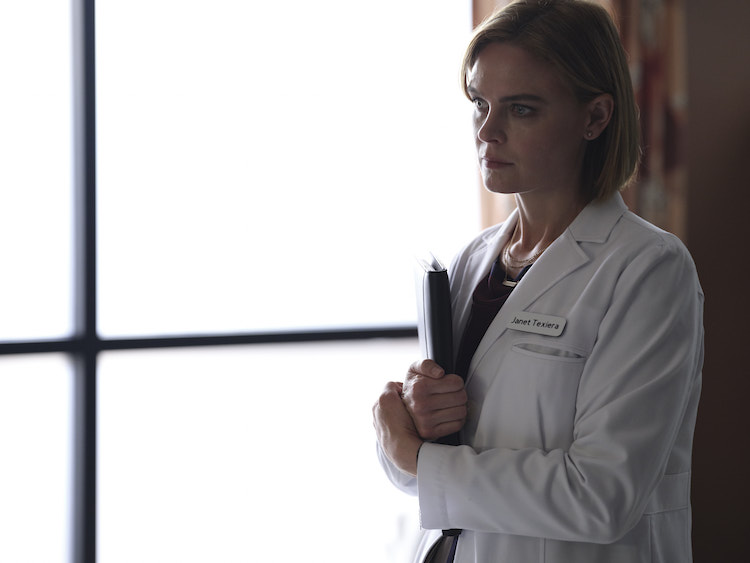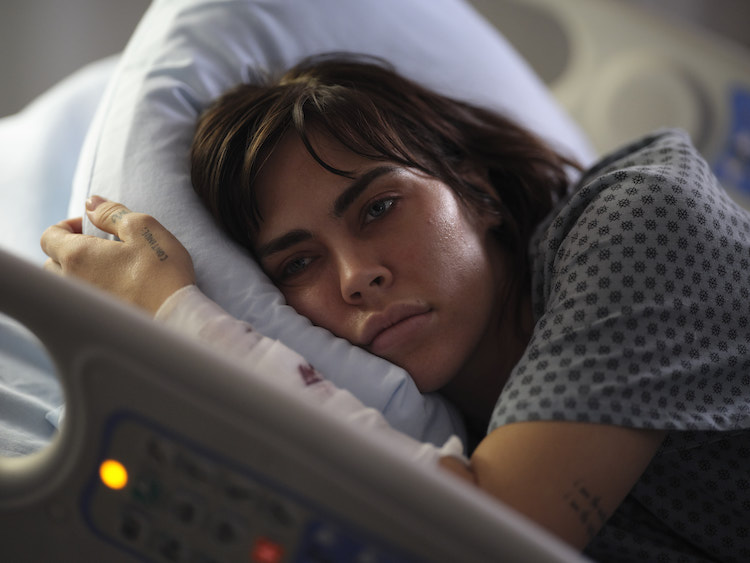Hey, friends! Barbarella here. It feels a little wrong that I have a ton of pep today while I’m covering a movie about the very serious topic of suicide, but here we are. Continue makes a personal and powerful statement from writer, director, and star Nadine Crocker, who survived her own suicide attempt in her twenties. In Theaters, On Demand and Digital September 6, 2024, Continue escorts viewers through Dean’s struggles as she experience life after a suicide attempt. Beautifully shot, the film also includes an unexpected love story, albeit, I’m not sure I believe that two people would be that flirtatious while discussing their past traumas, but just because I wouldn’t flirt while sharing horrific things from the past doesn’t mean it’s not possible that some people might. Anyway, before I veer too far off-topic, the movie stars an actor of whom I’ve been a fan since first seeing him about fifteen years ago in an independent film at Fantastic Fest called Deadgirl, and I’m grateful to have the opportunity to chat with that actor, Shiloh Fernandez, about the film.
 Right out of the gate, I share my love of Deadgirl and Shiloh’s performance in it. Check out his response and the rest of our conversation!
Right out of the gate, I share my love of Deadgirl and Shiloh’s performance in it. Check out his response and the rest of our conversation!
Shiloh: That is so sweet. It’s still one of my favorite movies. I loved doing a small movie like that, and all these years later, to do Continue, I think it was maybe the 2nd smallest. It is really neat having these small movies make an impact.
Barbara: I don’t know what it says about me, but Deadgirl was one of my favorite movies that came out that year.
Shiloh: You know, I didn’t even see it as a horror movie when I read it. It was more like a Western to me. Of course, it’s a lot; the metaphors are large, but if you really do understand what it’s about, this sort of male toxicity situation, then I think you can enjoy the movie on another level, so I appreciate that you stuck around and understood what we were trying to do with it. It was not just a gross-out movie; they were saying something with it.
Barbara: I think it would do well if they re-released it with the [current] culture.
Shiloh: Yeah, I think they just did some sort of Blu-Ray for the fifteen-year anniversary, something like that. There's a woman who's doing a book version of Deadgirl, so I think I'm going to write the intro to that book. Maybe our conversation will spark another run of Deadgirl.
Barbara: That’d be great. Very cool. So shifting over to Continue, how did you get involved in this project?
![[L-R] Nadine Crocker as “Dean” and Lio Tipton as “Bria” in the drama CONTINUE, a Lionsgate release. Photo courtesy of Lionsgate. [L-R] Nadine Crocker as “Dean” and Lio Tipton as “Bria” in the drama CONTINUE, a Lionsgate release. Photo courtesy of Lionsgate.](https://media.aintitcool.com/media/uploads/article_images_2022/barbarella/continue_9.jpg) Shiloh: Nadine offered me the film, but unlike some offers that you get that just go through your manager, she sent along a personal letter that was sort of explaining why she's making the film, why it was so important to her, why she thought that I'd be right for the part, and that's always nice to get to have a little bit more of a personal understanding. Of course, you can read a script and enjoy the script and want to do it for that reason, but it was really great to get that personal sort of aspect. We happened to live near each other, so she came over, and we had a few hours long conversation about how I could be helpful in the movie, what she wanted from the character, what she wanted from the film overall, and so we really connected. I just believed in her from that moment on. I really wanted to support her and do the movie. Of course, it was not an easy movie to make. It was a small movie, but I felt like she was just a powerhouse, and that I would kind of want to follow her anywhere. It was really neat to be a part of it.
Shiloh: Nadine offered me the film, but unlike some offers that you get that just go through your manager, she sent along a personal letter that was sort of explaining why she's making the film, why it was so important to her, why she thought that I'd be right for the part, and that's always nice to get to have a little bit more of a personal understanding. Of course, you can read a script and enjoy the script and want to do it for that reason, but it was really great to get that personal sort of aspect. We happened to live near each other, so she came over, and we had a few hours long conversation about how I could be helpful in the movie, what she wanted from the character, what she wanted from the film overall, and so we really connected. I just believed in her from that moment on. I really wanted to support her and do the movie. Of course, it was not an easy movie to make. It was a small movie, but I felt like she was just a powerhouse, and that I would kind of want to follow her anywhere. It was really neat to be a part of it.
Barbara: What kind of notes did she give you on the character?
Shiloh: I don't know if she gave me notes. I think that it was more a conversation of what my experience has been surrounding this sort of situation. I am not a musician, but I do play music. I'm from Northern California, so there were a lot of similarities. Of course, I have had friends, family affected by mental health, suicide, and I think that what was neat about this character, Trenton, is that he really sticks with Dean through thick and thin, and I think that's really hard to do in my own life. I haven't been as good about checking in when you should or knowing somebody's struggling and picking up the phone. I really like that aspect that this person. Playing this character might make me a better person by just being able to, maybe through osmosis, show up a little bit more for people in my own life.
Barbara: That's kind of a segue into what I was going to ask next. Sometimes an actor can learn something from embodying a character. What did you learn from Trenton?
Shiloh: I think that's kind of it. I know that for me, if I feel like somebody's struggling, and I don't make that call, it sort of snowballs, and then I feel like, “Oh no, I didn't call back then, so now I can't do it,” and that's just not true. We all go through struggles. I think every day we sort of get caught up in our own things. We're walking by people and assuming that they don't have issues going on. I just think it's so important to remember that everybody's going through something, whether it's them or somebody that's close to them. We have to treat each other with kindness and show up for each other and support each other. It’s a very obvious lesson, but something that we forget, I forget. So I hope that playing this character will remind me that I need to be good to people, show up for people, and never assume what somebody's going through. ![[L-R] Shiloh Fernandez as “Trenton” and Nadine Crocker as “Dean” in the drama CONTINUE, a Lionsgate release. Photo courtesy of Lionsgate. [L-R] Shiloh Fernandez as “Trenton” and Nadine Crocker as “Dean” in the drama CONTINUE, a Lionsgate release. Photo courtesy of Lionsgate.](https://media.aintitcool.com/media/uploads/article_images_2022/barbarella/continue_13.jpg)
Barbara: Yeah. In the movie, Dean says that she believes she needs to stay in a dark place to create art. What are your thoughts on that?
Shiloh: Yeah, that's tough. I do feel like especially getting this role, that everything that I've gone through in my own life is sort of what I use to channel into my performances or into my movies. It's why I like doing these darker dramas. I remember my dad gave me Eckhart Tolle's book “The Power of Now” when I was in my early twenties, maybe around Deadgirl, and I thought that it was sort of trying to steal away these scars of my past that were the things that were helping me with my art in some way. What I know for a fact is that that's not true. Some of my favorite artists, who are also great friends, have gotten sober, have gotten married, have very full lives that don't have that sort of dark thing that's pulling them down all the time, and they make some of the most beautiful art.
I think it's a real struggle. I think part of that is how do we walk through this darkness? How do we find our light? It's easier to not have to face that, not have to deal with these emotions, so it's a very good excuse to stay in a dark place, and it's something I've struggled with in my own life and my own self, my own sort of art. Can I heal myself from these past things and still be able to deliver this drama or these characters that are going through these things that I've had similar things that I've gone through? So it's a tough one, but I don't think that people have to be in a dark place to create art.”

Barbara: Obviously, suicide, pretty heavy topic. What was the mood like on set?
Shiloh: With Nadine leading the charge, it was a really incredible atmosphere, a lot of camaraderie, felt like a little family. Her husband Anthony, who's also in the film, was a producer, so he was bringing catering or moving stuff, setting up scenes. With all that darkness that was going on [in the story], it was a really cathartic experience to be able to play these scenes and also be able to hug each other afterwards. It's one of my favorite things about movies where there's entertainment on one level and then there's a much larger conversation on another level. Not all movies necessarily have to do that, but some of my favorite movies do do that, like Deadgirl, for example, orContinue. We knew while we're doing all this sort of dark drama, there's a bigger idea behind it.

Barbara: What was your favorite day on set and why?
Shiloh: I really liked the beginning sequence where we meet, remembering these feelings of where you meet somebody new, whether it's a friend or a romantic person that you've met, and you sort of get those butterflies. I really enjoyed that part of getting to know her, those sort of early scenes. My little brother was in high school, and he'd never been to a set before, and he came the day that we had that huge blowout fight where there's bottles broken, there's slapping. That was kind of funny to have this high school kid come on this most serious day. But truly every day was awesome. Having Nadine's husband Anthony there and seeing his support for his wife and their relationship…the DP Sy [Turnball] also was just so incredible. It was just so fun. We got to go to San Francisco, we shot in LA, we shot in Joshua Tree. I honestly loved every day. There wasn't a day that was like, “oh, this sucks,” or “this is hard.” It was awesome. It was great.
It was also great chatting with Shiloh, who genuinely seems like one of the nicest guys around. A portion of the proceeds from Continue will be donated to non-profits supporting mental health and suicide prevention. In addition, Nadine Crocker has created her own non-profit, the Continue On Organization which has a goal of providing mental health services to underpriviledged youth. If you want to do a good deed and check out Continue, it will be In Theaters, On Demand and Digital September 6, 2024. Check out the trailer!
